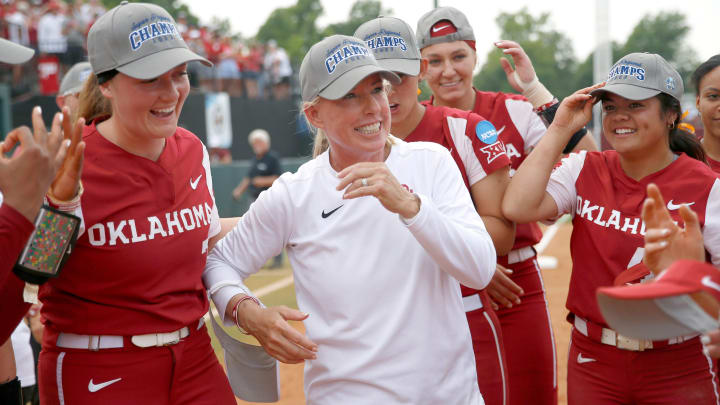Oklahoma Makes Winning Look Easy, but Can It Really Win a Three-Peat?

There is one college softball coach who understands what it takes to do what Patty Gasso is doing at Oklahoma.
Her Sooners have won a record 48 games in a row (and counting). Last weekend, they eclipsed the previous Division I record of 47, set by Arizona under Hall of Fame coach Mike Candrea in the late 1990s. Now retired, Candrea has been fielding calls about the old record lately, praising Gasso and Oklahoma: He knows, after all, how difficult it is to win like this. And he also knows how difficult it is to do what Gasso is trying to do next.
Think winning 47 (or 48) in a row is hard? Try winning three consecutive titles.
Gasso and the Sooners are the No. 1 seed in the Women’s College World Series, beginning Thursday in Oklahoma City, which they have won each of the past two years. If a team’s status as favorites can somehow be understated by a top seed, that’s the case here, with a squad that has dominated competition in just about every capacity all year long. (Oklahoma leads the nation in both hitting and pitching, with a .462 team OBP and 1.00 team ERA, respectively.) But it takes more than talent to win it all back-to-back-to-back. The only program with three consecutive titles is UCLA, which won in 1988, ’89 and ’90. To keep winning at this time of year requires talent, yes, but also incredible focus and more than a little bit of luck.
It’s one thing to look like the best team in the nation for three straight years. It’s another entirely to win three straight championships.
Just ask Candrea. He won eight championships at Arizona—including three separate pairs of consecutive ones. His Wildcats won five titles in the seven seasons from 1991 to ’97 and were easily the program of the decade. But they never managed to win three in a row.
“The biggest opponent was ourselves. It wasn’t necessarily who we were playing,” Candrea says. “I think I see a lot of that in Oklahoma right now.”

Candrea says he tried to make sure his teams did not get caught in the particulars of their win streak or of what it would mean to extend their championship reign; Gasso says much the same. It’s standard operating procedure for any coach steering a team under tremendous pressure. Yet it’s easier said than done.
“Athletes at that level, they just kind of put their heads down and get to enjoying the process, enjoying what they’re doing,” Candrea says. “They’re not really counting how many they have or what’s next. And that becomes an expectation—you know, at the end of the day, the expectation was to win a national championship.”
Gasso and Candrea have been linked for a long time. They met in her first year as a D-I head coach when Oklahoma and Arizona played in 1995: The Sooners were just trying to find a pathway to success, while the Wildcats were at the height of their powers. Arizona won, 12–1. That started a trend that took years to abate: Gasso lost her first 10 matchups against Candrea. But she was grateful for what she learned from those losses. And that made it all the more special to break his record all these years later.
“It’s Arizona and Mike Candrea, and what Arizona did back in the day was phenomenal,” Gasso said at her postgame press conference after win No. 47. “He is the reason why I had to learn how to do things different. Because when I was here as a young coach, he was run-ruling the daylights out of us. I just had to take it and learn. And I told him that—we’ve become good enough friends that we share those things.”
Watching from afar these past few years, Candrea says he’s seen Gasso grow far more comfortable with herself as a coach than she was in those early years. “She’s maybe found that niche to take pressure off herself and take pressure off the game,” he says. That’s reflected in her team, which always seems to be cheering for each other, having fun, celebrating the little things. Advice on going for a third straight championship? Candrea doesn’t think Gasso needs any. But he sees her team doing much of what he believes it should take.
“A lot of it is just looking at the present moment, not getting too far ahead of yourself,” Candrea says. “It’s making sure that you respect every opponent and you fear none.”
For years, Candrea had people tell him that Arizona’s record win streak would stand forever. He wasn’t sure he ever quite believed that. Now that it’s fallen? He can’t imagine a more fitting team to have done it—and to potentially go even further.
“Streaks are made to be broken,” Candrea says. “And I can’t think of a better team right now.”
